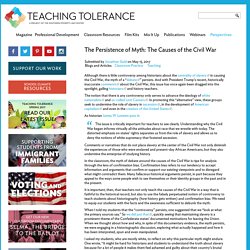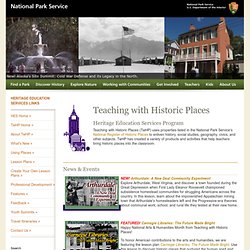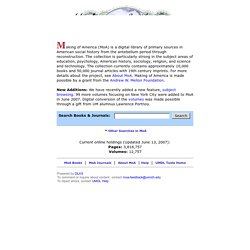

DocsTeach. ABC-CLIO’s Educator Support Community. The Persistence of Myth: The Causes of the Civil War. Although there is little controversy among historians about the centrality of slavery in causing the Civil War, the myth of a “debate” persists.

And with President Trump’s recent, historically inaccurate comments about the Civil War, this issue has once again been dragged into the spotlight, galling historians and history teachers. The notion that there is any controversy only serves to advance the ideology of white nationalists and so-called Lost Causers. In promoting this “alternative” view, these groups seek to undermine the role of slavery in secession, in the development of American capitalism and even in the creation of the United States.
As historian James W. Loewen puts it: The issue is critically important for teachers to see clearly. Comments or narratives that do not place slavery at the center of the Civil War not only diminish the experiences of those who were enslaved and present-day African Americans, but they also undermine the enterprise of studying history. Timeline of History. History Engine: Tools for Collaborative Education and Research. Join now and save on a Newspapers.com Subscription. Chronicling America « Library of Congress.
Parable of the Polygons - a playable post on the shape of society. This is a story of how harmless choices can make a harmful world. These little cuties are 50% Triangles, 50% Squares, and 100% slightly shapist. But only slightly! In fact, every polygon prefers being in a diverse crowd: You can only move them if they're unhappy with their immediate neighborhood.
Once they're OK where they are, you can't move them until they're unhappy with their neighbors again. “I wanna move if less than 1/3 of my neighbors are like me.” Harmless, right? Drag & drop unhappy polygons until nobody is unhappy: (just move them to random empty spots. don't think too much about it.) And... our shape society becomes super segregated. Sometimes a neighborhood just becomes square, and it's not their fault if no triangles wanna stick around. In this next bit, unhappy shapes automatically move to random empty spots. Run this simulation a few times. what happens? What's up with that?
Small individual bias can lead to large collective bias. The Undocumented. American Studies @ The University of Virginia. First Ladies' Library. Archiving Early America - Your Window Into America's Founding Years. Zoom In. CommonLit. Archiving Early America - Your Window Into America's Founding Years. History. FREE – Federal Registry for Educational Excellence. Digital Public Library of America. HarpWeek: Explore History. Browse Lesson Plans. U.S. Department of State. Exploring Constitutional Law. Smithsonian's History Explorer. The History Place. Classroom Materials. US History, American History. A Program of the National Park Service.
NEW!

Arthurdale: A New Deal Community Experiment Explore Arthurdale, West Virginia, and discover a town founded during the Great Depression when First Lady Eleanor Roosevelt championed subsistence homestead communities for struggling Americans across the country. In this lesson, learn about the impoverished Appalachian mining town that Arthurdale's homesteaders left and the Progressive-era theories about communal work, school, and rural life they tested at their new home.
Meet 21st Century State Standards with TwHP Teaching with Historic Places lesson plans, based on the inquiry method, provide teachers with materials and question sets that encourage analytical thinking. This makes them a great choice for classrooms where students need to meet Common Core state standards and social studies standards based on the College, Career & Civic Life Framework. Preserve America Find TwHP lessons featuring historic sites in Preserve America Communities. DocsTeach. Mission US. American Dynasties. Digital Docs in a Box. The Historical Marker Database. Art Access: Indian Art of the Americas. National Park Service - Museum Management Program. ARTSEDGE: The Kennedy Center's Arts Education Network. University Library Making of America Collection. Making of America.
Aking of America (MoA) is a digital library of primary sources in American social history from the antebellum period through reconstruction.

The collection is particularly strong in the subject areas of education, psychology, American history, sociology, religion, and science and technology. The collection currently contains approximately 10,000 books and 50,000 journal articles with 19th century imprints. For more details about the project, see About MoA. Making of America is made possible by a grant from the Andrew W. Mellon Foundation. New Additions: We have recently added a new feature, subject browsing. 99 more volumes focusing on New York City were added to MoA in June 2007. Historypin. Mission US.